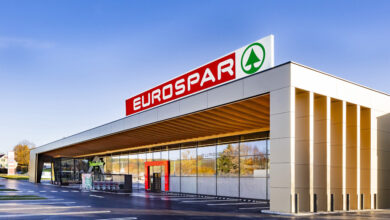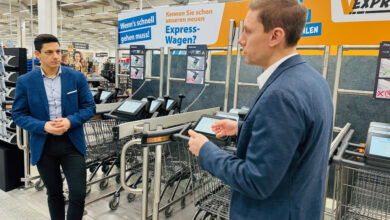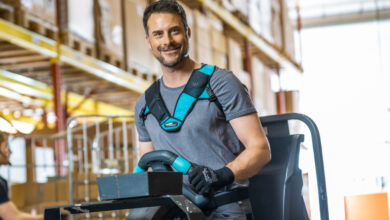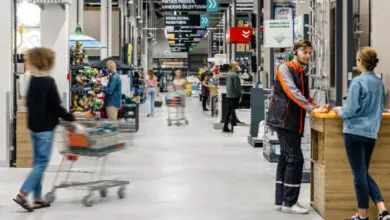Salling Groups Netto tests smart shopping trolleys from Imagr
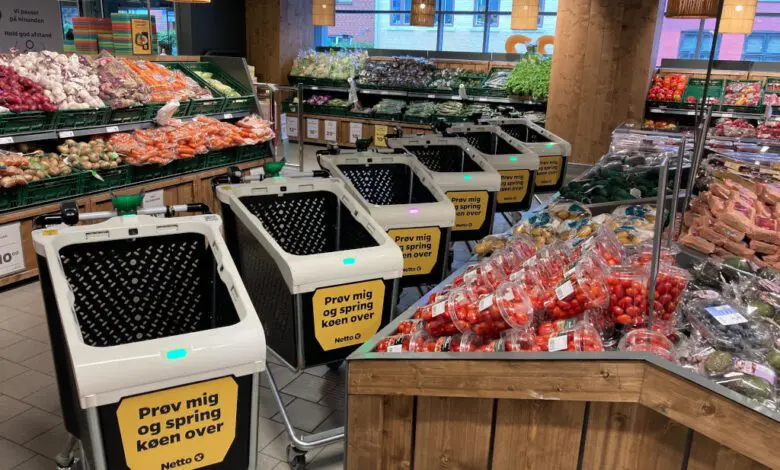
Danish Salling Group is testing digital shopping trolleys from the New Zealand start-up Imagr in five stores of its discount banner operation Netto. The retail company is the first in Europe which uses the solution of this provider. The vision recognition-based identification of the products is linked in real time with shoppers’ smartphones.
To shop with this technology, customers at Netto Denmark have to install the Netto+ app where they can store there their preferred payment method. At the beginning of the shopping trip, they need to connect their smartphone with the shopping trolley by scanning a QR code that is attached to the cart.
As the customer fills his shopping trolley with products, the items are captured via four cameras located on the inside of the cart. Imagr’s software identifies with image recognition and AI technology automatically each item as it is placed inside. It is then added in real time to the customer’s digital shopping basket on the smartphone. Products which customers takes out of the shopping trolley are automatically booked out by the system in the same way.
Thanks to the available product data, customers always have control over their shopping basket and can, for example, also view the total discount of their purchase. The customers receive a barcode on the smartphone when they finish their shopping. With this, they can make the payment directly via smartphone with the payment function of the self-scanning app Netto Scan&Go and receive their receipt digitally. Alternatively, they can also use the barcode to pay for the purchase at any other checkout.
“We hope that by using the smart shopping trolleys, we will gain more time to offer our customers an even better service in the stores,” said Braw Bakir, CEO of Netto, in a press release. For the products to be recognised automatically, the image data of every single product in Salling Groups Netto’s entire range of goods is digitally captured in advance.
The Netto+ app uses this data in real time while the customer is shopping. If the retailer does not have its own app, the Imagr app can be used as an alternative. To operate the digital shopping trolley, the retailer needs a charging station, a desktop-sized server, and an imaging station to capture items.
As an alternative to shopping with the client’s smartphone, the trolley can also be equipped by the retailer with attached tablets. It is also possible to upgrade existing shopping carts with the necessary Imagr technologies to keep the acquisition costs as low as possible. At Netto Denmark, customers can now test the smart shopping cart in all five pilot stores in Kirkegårdsvej and Kongelundsvej (Copenhagen), in Runevej (Aarhus), Bybuen (Skovlunde) and in Virum.
Another live test of Imagr’s new technology is currently taking place at a first Oasis Nakanoshima store in Osaka, Japan. It is 850 square metres in size and offers 8,000 SKUs. Customers can try out smart shopping baskets with the same technology instead of smart shopping carts. Unlike Netto, customers in this pilot store use the Imagr app. The test store belongs to the Japanese retail conglomerate H2O, which operates around 150 Oasis and Izumiya supermarkets.
The Retail Optimiser gives an overview of smart shopping trolleys that retailers are testing
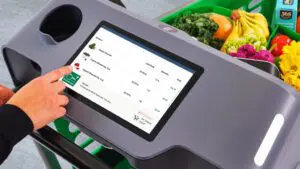
Amazon introduces improved Dash Cart
Amazon announced an improved version of its smart shopping trolley Dash Cart. The new generation holds more items, is lighter and can also be used outdoors. It has first been introduced at a Whole Foods store in Westford, Massachusetts.
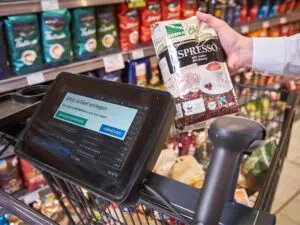
Edeka Südwest trials Smart Shopper from KBST
In its E-Center Gundelfingen, the Edeka regional co-operative Südwest is piloting intelligent shopping trolleys from Kaufungen-based start-up KBST. The retailer is currently testing customer acceptance with 20 of the systems called Smart Shopper.
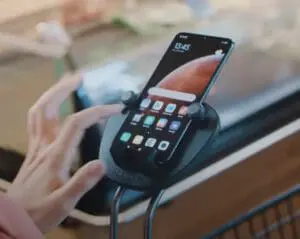
Metro minimises self-scanning costs and risks with Nomitri
Metro is introducing self-scanning with customers’ smartphones in its wholesale stores. Software from start-up Nomitri uses visual AI and the camera of the smartphone to detect potential fraud and generate personalised offers.

Aldi Süd trials automated product recognition with Shopic
In Australia, Aldi Süd is testing automated recognition of products placed in shopping trolleys using technology from Israeli start-up Shopic. The solution, which eliminates the need for scanning at the checkout, is so exciting, that the company had also installed it for a short period of time in its innovations store near its headquarters in Mülheim an der Ruhr, Germany.

Jumbo tests smart shopping trolley from Walkout
Jumbo is testing acceptance and sensible usecases of smart shopping trolleys. At Jumbo food market in Veghel, the Dutch retailer is piloting a Shop & Go solution of Israeli start-up Walkout.

Kroger pilots smart shopping cart from Caper
Kroger is testing smart shopping carts from New York start-up Caper. Retailers around the world are increasingly testing computerised shopping carts, from a wide variety of providers.
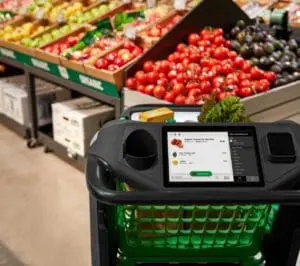
Amazon again sets the pace for POS technologies
Again, Amazon is putting the world of in-store technology in a state of awe. This time with Dash Cart, a shopping trolley that automatically logs products placed inside. It will have its first appearance it the soon-to-be opened first 3,000-square-metre Amazon supermarket in Woodland Hills. It is likely that Amazon will also equip its Wholefood Stores with the new checkout process.

